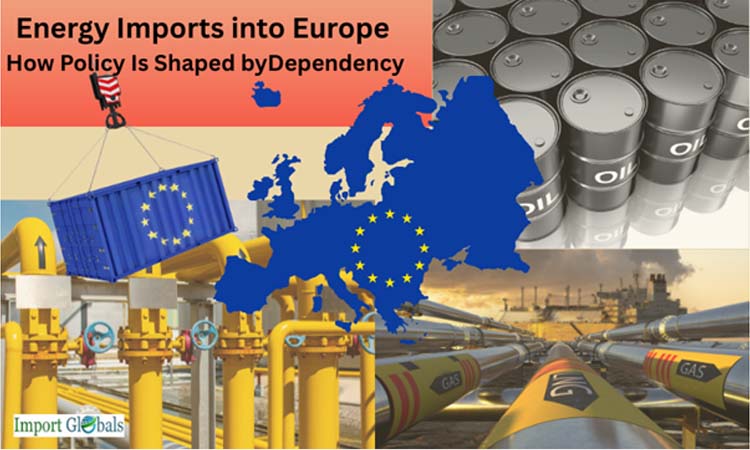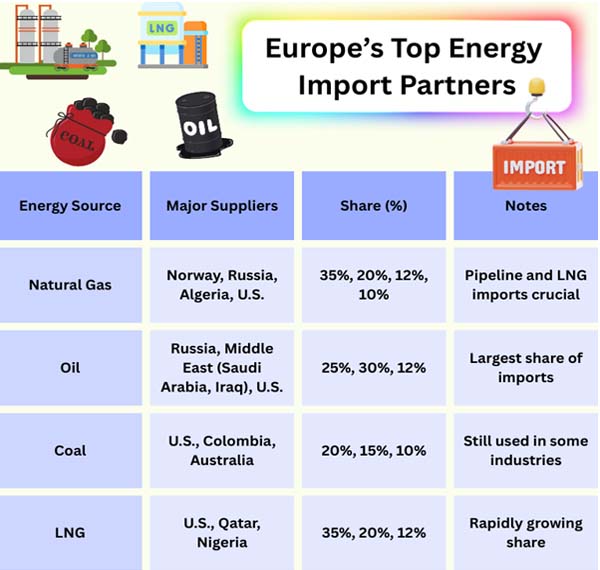
- Oct 07, 2025
Energy Imports into Europe: How Policy Is Shaped by Dependency
Natural gas pipelines that span continents and LNG shipments that arrive at ports are only two examples of how the continent's reliance on outside energy sources has greatly impacted its policy.
As per Europe Export Data, Energy imports influence economic relations, political tactics, and the continent's overall approach to climate pledges, in addition to determining the region's energy security.
The Level of Energy Dependency in Europe
Europe is a major global importer of energy, especially natural gas and oil. The continent is mostly dependent on outside partners to fulfill local demand because its own fossil fuel supplies are limited. Since imports account for almost 60% of the EU's energy consumption, the EU is particularly vulnerable to supply interruptions, market volatility, and geopolitical unrest.
Europe Import Export Trade Data by Import Globals indicates that Oil, natural gas, coal, and increasingly renewable energy equipment are all included in energy imports. Natural gas is still the most common imported energy source, after oil. As coal-fired power facilities have been phased out and nuclear energy has been reduced in several member states during the past ten years, there has been a significant increase in reliance on imported gas.
Key Energy Suppliers to Europe
In the past, Europe's energy security has been dependent on a select group of providers. Up until recently, as per USA Import Data by Import Globals, the biggest source of oil and natural gas was Russia. However, Europe has been forced to diversify its energy imports due to political tensions and wars. The shift to LNG supplies from Qatar, Africa, and the United States has greatly decreased the need for Russian pipelines. Particularly for natural gas, Norway has emerged as one of Europe's most significant suppliers.

Geopolitics and Energy Dependency
Russia Import Trade Analysis by Import Globals reveals that energy imports are extremely political affairs rather than just business dealings. Europe's foreign policy choices have always been limited by its reliance on Russian natural gas. Russian pipelines have provided inexpensive energy for many years, but at the expense of strategic vulnerability.
Europe had to quickly diversify, invest in LNG facilities, and negotiate energy relationships with nations in the Middle East, Africa, and North America as a result of the interruption of gas supply brought on by geopolitical conflicts. Europe's foreign policy has therefore been heavily influenced by energy dependency, which forces it to strike a balance between political independence, affordability, and security.
The Transition to Energy Independence and Renewables
Europe's import portfolio is dominated by fossil fuels, but the continent is also making a bold move toward renewable energy. Based on Europe Export Data by Import Globals, achieving net-zero emissions by 2050 is the goal of the European Green Deal and its climate ambitions. This shift entails lowering dependency on imported fossil fuels while increasing indigenous wind, solar, and hydroelectric capacity.
It's interesting to note that imports are necessary even for sustainable energy transitions. For vital raw minerals like lithium, cobalt, and rare earth elements, which are needed to make solar panels, wind turbines, and batteries for electric vehicles, Europe is dependent on outside markets. As per Africa Import Data by Import Globals, imports of minerals and technology are replacing fossil fuels as the primary source of energy, expanding the range of trade and policy issues.
Measures of Policy Influenced by Imported Energy
Europe's international and internal policies are directly impacted by its reliance on energy imports. Among the crucial actions are:
- Supplier Diversification: LNG supply agreements with the United States, Qatar, and African nations.
- Infrastructure investment: Qatar Import Trade Statistics shows that it includes the development of cross-border pipeline networks and LNG terminals.
- Energy Efficiency Initiatives: Laws aimed at lowering energy use by implementing efficiency improvements.
- Strategic Reserves: accumulating funds to mitigate supply disruptions.
- Investments in Renewable Energy: boosting the development of wind, solar, and hydrogen to reduce dependency on fossil fuels.
These actions demonstrate the fine line that must be drawn between immediate energy security and long-term climate objectives.
Future Difficulties
Notwithstanding advancements, Europe still confronts many obstacles in lowering its reliance on energy:
- High Costs: Pipeline gas is less costly than LNG imports.
- Infrastructure Gaps: Countries in Eastern Europe have less access to LNG terminals than other countries.
- Market Volatility: Disruptions are still common in the world's oil and gas markets.
- Dependency on Raw Materials: Importing essential minerals is necessary for renewable energy sources.
For many years to come, Europe Import Data suggests that policies will continue to be shaped by the need to balance affordability, security, and sustainability.
Conclusion
Energy security is now a key component of Europe's diplomatic, economic, and environmental policy due to its significant reliance on energy imports. New dependencies are developing in the shape of green technology and vital minerals, even as diversification initiatives and investments in renewable energy are lowering risks. The continent's approach shows a continuous battle to balance short-term energy demands with long-term environmental objectives. Europe's ability to maintain this equilibrium will determine both its economic resiliency and its position as a worldwide leader in climate action. Import Globals is a leading data provider of Europe import export trade data. Subscribe to Import Globals to get more global trade details!
FAQs
Que. Which country supplies the most natural gas to Europe today?
Ans. Russia Import Export Trade Analysis indicates that Norway has become the largest natural gas supplier to Europe, surpassing Russia in recent years.
Que. How much of Europe’s energy comes from imports?
Ans. Around 60% of the EU’s energy consumption relies on imports, primarily oil and gas.
Que. Is Europe reducing its dependence on fossil fuels?
Ans. Yes, through policies like the European Green Deal, Europe is investing heavily in renewables, though fossil fuels remain dominant.
Que. What role does LNG play in Europe’s energy security?
Ans. Africa Export Import Global Trade Data finds that LNG from the U.S., Qatar, and Africa has become essential in diversifying energy sources and reducing reliance on Russian gas.
Que. Where can you obtain detailed European import data?
Ans. Visit www.importglobals.com or email info@importglobals.com for more information on up-to-date data.
